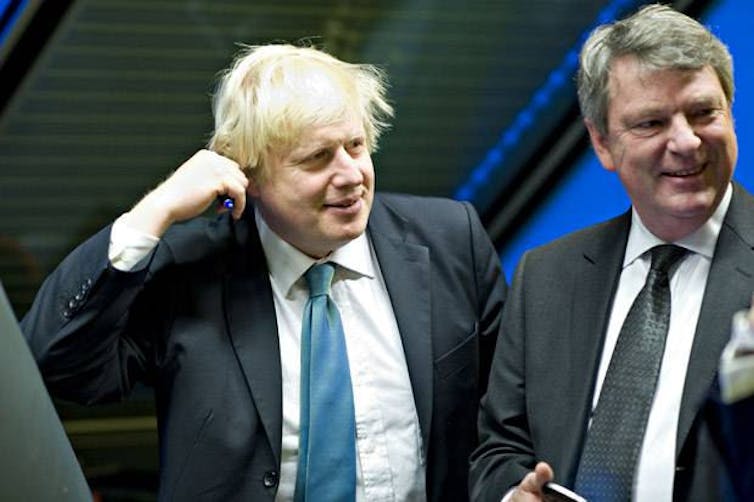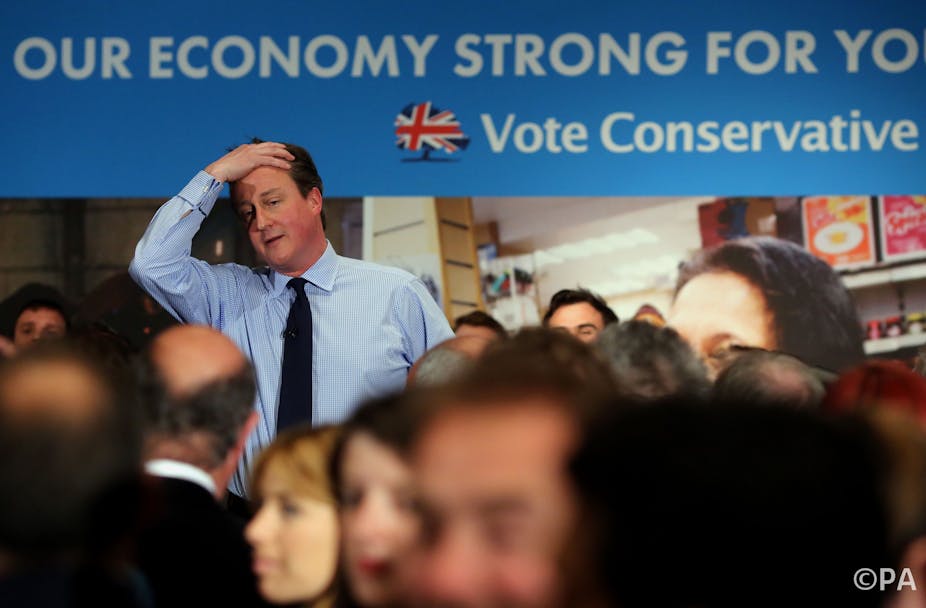While all election campaigns are different – and this one is more different than most – there’s usually an incident or two that gives the political obsessive a pleasant reminder of bygone days.
So far in 2015, no-one has emulated the immortal John Prescott punch of 2001. But David Cameron has just undergone his version of Margaret Thatcher’s Wobbly Thursday of 1987, when a Daily Telegraph poll put her party’s lead down to 4% just a week before the vote.
Cameron’s wobble spread across a whole weekend. First Tory donors lined up to attack his uninspiring election campaign, then it was claimed the members of his cabinet were already calling round for supporters in their bids to replace him as leader. It all ended with Cameron unable to remember which football team he is supposed to support.
“Wobbly Weekend” certainly gave Labour supporters hope that it would be followed by Meltdown Monday. But history should act as a lesson. While some Tory strategists undoubtedly lost their nerve in 1987 – almost provoking a Prescott-like bout of pugilism in Central Office – the crisis had the effect of galvanising a lacklustre campaign and the Conservatives went on to secure a comfortable majority.
By all accounts, David Cameron is not panicking. It’s just possible that in hindsight the best parallel to the Tory campaign of 2015 will be found in the 1970 election.
On that occasion, Tory leader Edward Heath had spent the election warning voters about the Labour government’s economic management but it seemed no one was listening. But when the votes were counted it seemed that the doleful message had got through after all – the Conservatives had landed a surprise victory.
We can expect a similar game plan this time round. Having made little headway on the subject of the economy, the Tories are likely to keep hammering away at it between now and polling day.
This is not to say, of course, that they have an unanswerable case to make. Rather, if handled correctly the subject can act as a shorthand surrogate for the more general issue of “governing competence”, which ultimately gives the Conservatives their best chance of a positive result on May 7.
Accentuate the positive
The big if here, of course, relates to the party’s ability to handle things correctly. Whatever one thinks of its governing competence, so far it has been far less than competent in its electoral campaigning. If the Conservatives do benefit from a last-minute vote of confidence from the electorate, it will be in spite of the campaign so far rather than because of it.
With or without the influence of campaign strategist Lynton Crosby, the party was always going to rely heavily on negative tactics. However, we might have expected strategists to use this unpleasant device with a bit more skill.
Perhaps they should have brought in Chelsea manager Jose Mourinho to help on the campaign. He would have told them that the best way to stifle the opposition is to park the bus in front of the goal, rather than drive it at full speed towards the edge of a cliff, as the Tories have done in their use of the SNP card.
In a perfect world they should also exercise more caution in their use of Boris Johnson’s calculated buffoonery; but presumably this factor is now beyond the current leadership’s control.

It is just possible that in moments of private frustration David Cameron really does wobble a bit. But, like a 1970s toy, he is likely to defy gravity for a bit longer.
On past form it’s clear that he relishes a fight as much as John Prescott ever did. Despite the electoral arithmetic and the monotonous message of the polls, it is still possible that he will lead his party to victory.
But whatever the outcome, it would be better for all concerned if he and his senior colleagues began to concentrate on the positive elements of their case. Otherwise it will not be surprising if potential Tory voters continue to wonder if the party really believes that it deserves to win.

